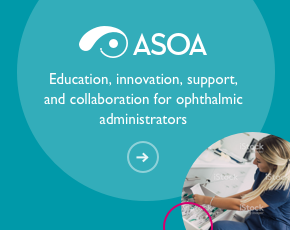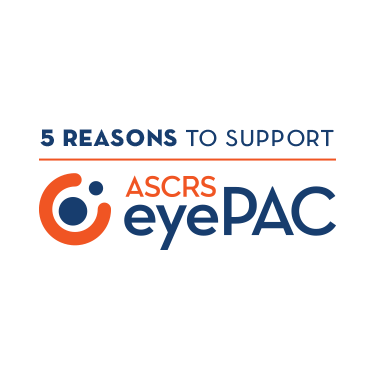Representatives Ami Bera, MD (D-CA), and Larry Bucshon, MD (R-IN), Introduce Bipartisan Legislation to Prevent Medicare Physician Payment Cuts from Going into Effect; ASCRS Joins the Surgical Coalition in Issuing Support – Use the ASCRS Grassroots Action Center and Ask Your Representatives to Co-Sponsor the Legislation
On October 30, Representatives Ami Bera, MD, and Larry Bucshon, MD, introduced the “Holding Providers Harmless from Medicare Cuts During COVID-19 Act of 2020,” bipartisan legislation that would prevent the pending Medicare physician payment cuts from going into effect for two years. Representatives Brendan Boyle (D-PA), George Holding (R-NC), Raul Ruiz, MD (D-CA), Phil Roe (R-TN), Abby Finkenauer (D-IA) and Roger Marshall (R-KS) are all original co-sponsors of the legislation. Specifically, the legislation gives an additional “hold harmless relief” payment to those codes where the 2021 total payment is less than the 2020 total payment, so that all codes facing a reduction are held harmless – and are paid at the 2020 payment levels.
ASCRS and the Surgical Coalition have issued support for the legislation. We need your help in urging members of the House of Representatives to co-sponsor the legislation. Please go to the ASCRS Grassroots Action Center and send a letter to your representative asking them to co-sponsor the Bera/Bucshon legislation. Background information, along with a copy of the legislation and a letter for you to send are all provided. If you have any questions, please contact Nancey McCann, ASCRS Director of Government Relations at [email protected].
Senators Steve Daines (R-MT) and John Boozman (R-AR) Weigh in with Senate Leadership on the Proposed Medicare Physician Payment Cuts and Urge Leadership to Address Before the End of the Year
On October 26, Senator Steve Daines sent a letter to the Republican and Democratic Senate leadership expressing his concerns with the proposed Medicare physician payment cuts scheduled to take effect on January 1, 2021 due to the budget neutrality requirement to pay for the increases in the E/M standalone office visit codes. The letter urges the Senate leadership to include provisions to address these pending cuts in legislation before the end of the year.
Senator John Boozman also sent a letter to the Senate leadership on October 29, raising the same concerns and expressing his desire to work with them to address this critical issue.
Imminent Cybercrime Threat to US Health Care Providers
The Federal Bureau of Investigation (FBI) and two federal agencies are warning of an "imminent cybercrime threat" to US hospitals and health care providers, noting that several hospitals across the country have already been hit. In a joint advisory, the Cybersecurity and Infrastructure Security Agency (CISA), FBI and the U.S. Department of Health and Human Services (HHS) said they have "credible information" that cybercriminals are taking new aim at health care providers and public health agencies as the COVID-19 pandemic reaches new heights. "Malicious cyber actors" may soon be planning to "infect systems with Ryuk ransomware for financial gain" on a scale not yet seen across the American healthcare system.
Hospitals, physician practices, and public health organizations should take "timely and reasonable precautions to protect their networks from these threats." Malware targeting techniques often lead to “ransomware attacks, data theft, and the disruption of healthcare services." The agencies recommend several mitigation steps and best practices for health care entities to take to reduce their risk, including the following:
- Patch operating systems, software, and firmware as soon as manufacturers release updates.
- Regularly change passwords to network systems and accounts and avoid reusing passwords for different accounts.
- Use multi-factor authentication where possible.
- Disallow use of personal email accounts
- Disable unused remote access/Remote Desktop Protocol (RDP) ports and monitor remote access/RDP logs.
- Identify critical assets; create backups of these systems and house the backups offline from the network.
- Set antivirus and anti-malware solutions to automatically update; conduct regular scans.
The AMA and the American Hospital Association (AHA) have created two resources to help physicians and hospitals guard against cyber threats. Those resources and additional cyber security information can be found at the AMA’s cybersecurity webpage.
Nov. 13 Deadline for Important Surveys on Cataract Services
ASCRS is working with the AAO to gather data on three CPT codes that may inform future recommendations for the codes’ payment values. If you received an email to fill out survey(s) related to cataract removal with drainage device insertion and/or lacrimal canaliculus drug eluting implant insertion, you have until Nov. 13 to respond. Check your inbox for an email from [email protected].
Physician Compliance Date for ONC Regulations Regarding the Access, Exchange, and Use of Patients’ EHI Extended to April 5, 2021
Earlier this year, the Office of the National Coordinator for Health Information Technology (ONC) released regulations implementing provisions of the 21st Century Cures Act (Cures) requiring physicians to comply with new regulations on the access, exchange, and use of patients’ electronic health information (EHI). Information blocking is a large focus of the regulations and is defined as practices that prevent or materially discourage the access, exchange, or use of EHI. Physicians, hospitals, electronic health record (EHR) vendors, and health information exchanges (HIE) and health information networks (HIN) are all subject to ONC’s rule and are collectively referred to as “Actors.” Actors whose actions are likely to interfere with the access, exchange, or use of EHI could be considered information blockers and subject to penalties or disincentives.
EHR vendors and HIE/HINs can receive up to $1 million in civil monetary penalties per violation. Penalties and other “disincentives” for physicians and all other health care providers have yet to be determined by the Department of Health and Human Services (HHS). However, physicians participating in the Promoting Interoperability (PI) Program of the Quality Payment Program (QPP) could see an impact to their Centers for Medicare and Medicaid Services (CMS) Merit-based Incentive Payment System (MIPS) incentives if they are found to be information blockers.
The Office of the National Coordinator for Health IT (ONC) announced this week, it is extending compliance deadlines for certain information blocking and health IT certification requirements. Originally, ONC’s Information Blocking Rule required all Actors—including physicians and hospitals—to come into compliance with information blocking requirements by November 2, 2020. Due to the pandemic, ONC’s interim final rule now pushes the information blocking compliance date to April 5, 2021.
The AMA has created a two-part educational resource to help physicians and their medical practices understand the requirements and develop an information blocking compliance program.
Part 1 of the AMA’s resource outlines what information blocking is, key terms to know, examples of information blocking practices, and a summary of exceptions for when physicians may restrict access, exchange, and use of EHI. Part 2 will help physicians start down the path of compliance, including questions to consider, considerations for maintaining a compliance program, and next steps.
The AMA and the physician community are also working to address concerns that the HHS’ rule forces physicians to release office notes and lab test results prior to physicians reviewing the information with the patient, and they are also working to reduce the complexity and cost required for physicians to comply with these new regulations.
CMS Releases Preliminary Results for 2019 Performance Year Quality Payment Program
On October 27, the Centers for Medicare & Medicaid Services (CMS) released a blog post and infographic to share preliminary participation data for the Quality Payment Program (QPP) in 2019.
It is important to note that those who were equal to or above the 75-point exceptional performance threshold will receive a maximum positive adjustment of up to 1.79%. MACRA provided for a separate pool of dollars for the exceptional performance category for six years that is not subject to budget neutrality. However, the Quality Payment Program overall is budget neutral. Therefore, due to the many COVID-19 related exceptions, there will be no money from the negative payment adjustments to be redistributed for positive adjustments. No one will receive a negative adjustment, and there will be no positive adjustments other than the exceptional performance bonus payments.
Additional findings include:
- 44% of MIPS eligible clinicians engaged in QPP.
- Overall, MIPS engagement rose from 871,838 clinicians in 2018 to 930,219 clinicians in 2019.
- MIPS APM participation rose from 356,546 clinicians in 2018 to 416,281 clinicians in 2019.
- 83% of MIPS eligible clinicians received reweighting of one or more MIPS performance categories.
- The number of Qualifying Advanced Payment Model Participants (QPs) rose from 183,306 clinicians in 2018 to 195,564 in 2019.
For More Information:
Contact the Quality Payment Program at 1-866-288-8292 or by e-mail at: [email protected]. To receive assistance more quickly, consider calling during non-peak hours—before 10 a.m. and after 2 p.m. Eastern Time (ET).



